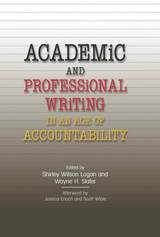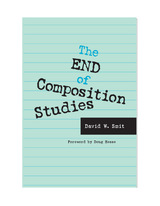2 books about Hesse, Douglas D.

Academic and Professional Writing in an Age of Accountability
Edited by Shirley Wilson Logan and Wayne H. Slater, with an Afterword by Jessica Enoch and Scott Wible
Southern Illinois University Press, 2018
What current theoretical frameworks inform academic and professional writing? What does research tell us about the effectiveness of academic and professional writing programs? What do we know about existing best practices? What are the current guidelines and procedures in evaluating a program’s effectiveness? What are the possibilities in regard to future research and changes to best practices in these programs in an age of accountability? Editors Shirley Wilson Logan and Wayne H. Slater bring together leading scholars in rhetoric and composition to consider the history, trends, and future of academic and professional writing in higher education through the lens of these five central questions.
The first two essays in the book provide a history of the academic and professional writing program at the University of Maryland. Subsequent essays explore successes and challenges in the establishment and development of writing programs at four other major institutions, identify the features of language that facilitate academic and professional communication, look at the ways digital practices in academic and professional writing have shaped how writers compose and respond to texts, and examine the role of assessment in curriculum and pedagogy. An afterword by distinguished rhetoric and composition scholars Jessica Enoch and Scott Wible offers perspectives on the future of academic and professional writing.
This collection takes stock of the historical, rhetorical, linguistic, digital, and evaluative aspects of the teaching of writing in higher education. Among the critical issues addressed are how university writing programs were first established and what early challenges they faced, where writing programs were housed and who administered them, how the language backgrounds of composition students inform the way writing is taught, the ways in which current writing technologies create new digital environments, and how student learning and programmatic outcomes should be assessed.
The first two essays in the book provide a history of the academic and professional writing program at the University of Maryland. Subsequent essays explore successes and challenges in the establishment and development of writing programs at four other major institutions, identify the features of language that facilitate academic and professional communication, look at the ways digital practices in academic and professional writing have shaped how writers compose and respond to texts, and examine the role of assessment in curriculum and pedagogy. An afterword by distinguished rhetoric and composition scholars Jessica Enoch and Scott Wible offers perspectives on the future of academic and professional writing.
This collection takes stock of the historical, rhetorical, linguistic, digital, and evaluative aspects of the teaching of writing in higher education. Among the critical issues addressed are how university writing programs were first established and what early challenges they faced, where writing programs were housed and who administered them, how the language backgrounds of composition students inform the way writing is taught, the ways in which current writing technologies create new digital environments, and how student learning and programmatic outcomes should be assessed.
[more]

The End of Composition Studies
David W. Smit
Southern Illinois University Press, 2007
Setting forth an innovative new model for what it means to be a writing teacher in the era of writing across the curriculum, The End of Composition Studies urges a reconceptualization of graduate work in rhetoric and composition, systematically critiques the limitations of current pedagogical practices at the postsecondary level, and proposes a reorganization of all academic units.
David W. Smit calls into question two major assumptions of the field: that writing is a universal ability and that college-level writing is foundational to advanced learning. Instead, Smit holds, writing involves a wide range of knowledge and skill that cannot be learned solely in writing classes but must be acquired by immersion in various discourse communities in and out of academic settings.
The End of Composition Studies provides a compelling rhetoric and rationale for eliminating the field and reenvisioning the profession as truly interdisciplinary—a change that is necessary in order to fulfill the needs and demands of students, instructors, administrators, and our democratic society.
[more]
READERS
Browse our collection.
PUBLISHERS
See BiblioVault's publisher services.
STUDENT SERVICES
Files for college accessibility offices.
UChicago Accessibility Resources
home | accessibility | search | about | contact us
BiblioVault ® 2001 - 2024
The University of Chicago Press









